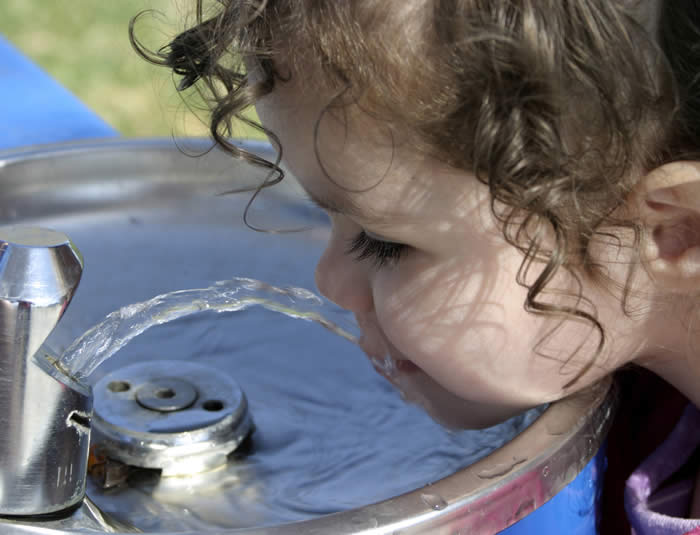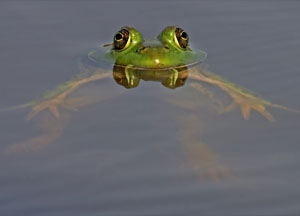Threatened Waters: Turning the Tide on Pesticide Contamination

Water is the most basic building block of life. Clean water is essential for human health, wildlife, and a balanced environment. Yet, water is being polluted at unprecedented rates, with pesticides, industrial chemicals, nutrients, metals, and other contaminants. Studies of major rivers and streams find that 90% of fish, 100% of surface water samples, and 41% of major aquifers contain one or more pesticides at detectable levels. As a result of pesticide contamination of streams, rivers, lakes, and underground water supplies, drinking water is also widely contaminated. Although individual precautionary measures provide a short-term solution, with a crisis in safety looming, steps can and must be taken to curtail pesticide use and adopt alternative practices and products to protect the nation's waterways.
According to Beyond Pesticides’ Eating with a Conscience database, more than 50 pesticides are known surface or groundwater contaminants, according to data from the U.S. Geological Survey (USGS) or Environmental Protection Agency (EPA). A new report by USGS, National Water-Quality Assessment (NAWQA) Project, reveals the presence of pesticides is widespread in U.S. rivers and streams, with almost 90% percent of water samples containing at least five or more different pesticides. Furthermore, USGS reports at least 143 pesticides and 21 pesticide transformation/breakdown products (metabolites) in the groundwater of over 43 states. Many of these pesticides are also linked to a range of human and environmental health effects, including cancer, birth defects, and neurological and reproductive health impacts.
It is essential that these pesticide contaminants not invade our waterways and drinking water. Unfortunately, improper oversight and lax enforcement mean that many of these pesticides do, in fact, continue to contaminate our environment.
Protecting Water Quality with Organic Practices
Read Organic Land Management and the Protection of Water Quality, a fully cited fact sheet by Beyond Pesticides, or download our shorter brochure version for more in-depth information on how organic practices can protect water quality.
Reduces/Eliminates Pesticide Runoff
Organic agriculture and its food production constitute a system that rejects the use of hazardous synthetic chemicals in the growing, handling, and certification of food. It is the only food production system that is subject to independent public review and oversight, assuring consumers that toxic, synthetic pesticides do not contaminate surface and ground waters. In fact, organic farming reduces or eliminates water pollution and helps conserve water and soil on the farm. According to the Food and Agriculture Organization, several countries in Europe compel or subsidize organic farmers to use organic techniques specifically to combat water pollution problems.
|
Reduces Nutrient
Runoff
Organic standards stipulate that soil fertility and crop nutrients can be managed through tillage and other cultivation practices such as crop rotation, which preserves and maintains the fertility of the soil so that synthetic inputs become unnecessary. Organic eliminates the need for and use of synthetic nitrogen/phosphorus-based fertilizers, thereby significantly reducing the threats of nitrogen and phosphorus runoff to aquatic ecosystems, and reduces the prevalence of algal blooms and eutrophication.
Prohibits the Use of Sewage Sludge/Biosolids
Organic does not allow, as a fertilizer, the use of sewage sludge, which is often contaminated with a host of chemicals including heavy metals, pharmaceuticals, and pesticides, which can all re-enter the aquatic environment once the sludge is recycled on land. Read Beyond Pesticides' article on Biosolids from the Fall 2012 Pesticides and You for more information.
 Resources
Resources
- Read "Pesticides in My Drinking Water? Individual precautionary measures and community action" from the Summer 2013 issue of Pesticides and You.
- Read Organic Land Management and the Protection of Water Quality, a fully cited fact sheet by Beyond Pesticides, or download our shorter brochure version to print and distribute.
- Read "Threatened Waters: Congressional assault on our environmental laws," from the Summer 2011 issue of Pesticides and You.
- See Threatened Waters: Turning the Tide on Pesticide Contamination or download a shorter, cited version of yhe article, published in the Winter 2005–2006 issue of Pesticides and You. (If you wish to purchase color hardcopies of the brochure, email [email protected] or call us at 1.202.543.5450.









